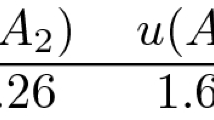Abstract
This paper concerns regret, where regretting is to be understood, roughly, as mourning the loss of a forgone good. My ultimate aim is to add a new dimension to existing debate concerning the internal logic of regret by revealing the significance of certain sorts of cases—including, most interestingly, certain down-to-earth cases involving vague goals—in relation to the possibility of regret in continued endorsement cases. Intuitively, it might seem like, in continued endorsement cases, an agent’s regret (if it is to make sense) must be tied to the idea that the forgone good is no better than the achieved good but is also not fully made up for by the achieved good because the goods are (too) different in kind. But this view is controversial. After describing a challenge to the view, as well as the main features of the debate regarding regret in which it figures, I appeal first to a fanciful case involving a set of ever-better options, and then to a more down-to-earth case involving a vague goal, to develop a defense of the opposing view that, even in continued endorsement cases, mourning the loss of a forgone good need not be tied to the idea that the loss of the good is not fully made up for by the gain of a preferred or incomparable good of a different kind.
Access this chapter
Tax calculation will be finalised at checkout
Purchases are for personal use only
Similar content being viewed by others
Notes
- 1.
The quoted phrase is borrowed from Tenenbaum and Raffman’s discussion of vague projects in “Vague Projects and the Puzzle of the Self-Torturer” (2012).
- 2.
- 3.
Two goods are fungible if some amount of one figures as a “perfect substitute” for some amount of the other, in the way that, to borrow from Richard Yetter Chappell (2015: 326–7), two ten-dollar bills (typically) figure as a perfect substitute for one twenty-dollar bill.
- 4.
In Nussbaum’s original version, the agent’s “rational principle” is to “maximize her bagel eating” (115).
- 5.
For a way of understanding the optimizing conception of rationality that allows for this, see, for example, (Mintoff 1997: Sect. 4), wherein Mintoff argues that “the optimising theory does not imply…that if one knows there is a better alternative to some action, then one ought not to perform that action” (119).
- 6.
I discuss many cases of the relevant sort in my prior work on temptation and choice over time. The case I will lay out here is a variation on my fun-size cakes case in (Andreou 2014).
- 7.
For interesting discussion concerning the philosophical issues surrounding the idea of vague goals, see (Tenenbaum and Raffman 2012). That discussion provides compelling support for taking cases like the one I am now considering at face value. I will provide some additional support for taking the cases at face value below. Note that, as my parenthetical remark in the text is meant to flag, I think that overindulging can be properly understood as both vague and graded. In a Pea Soup post, Chappell (2016) suggests that goals or ends that are described as vague are usually better understood as simply graded. But his position is controversial (as suggested by some of the responses to his post), and he acknowledges that vague goals may indeed be possible, so considering the significance of vague goals in relation to rational regret is, I think, still very much in order.
- 8.
In particular, knowing (for some given n and n+1) that there are other stopping points available does not eliminate or reverse your preference for eating a total of n+1 chips over eating a total of n chips, even if it complicates matters given that, as will become apparent, this preference combines with your preferences over other pairs of options in a way that can leave you stumped about where to stop.
- 9.
References
Andreou, C. (2016). Cashing out the money-pump argument. Philosophical Studies, 173, 1451–1455.
Andreou, C. (2015). The real puzzle of the self-torturer: Uncovering a new dimension of instrumental rationality. Canadian Journal of Philosophy, 45, 562–575.
Andreou, C. (2014). Temptation, resolutions, and regret. Inquiry, 57(3), 275–292.
Andreou, C. (2007). There are preferences and then there are preferences. In B. Montero & M. D. White (Eds.), Economics and the Mind (pp. 115–126). New York: Routledge.
Chappell, R. Y. (2016). Do we have vague projects? Pea Soup: Philosophy, Ethics, Academia. http://www.peasoup.us/2016/08/do-we-have-vague-projects/.
Chappell, R. Y. (2015). Value receptacles. Noûs, 49(2), 322–332.
Dancy, J. (1993). Moral Reasons. Oxford: Blackwell.
Hurka, T. (1996). Monism, pluralism, and rational regret. Ethics, 106(3), 555–575.
Hurley, S. (1989). Natural reasons. New York: Oxford University Press.
Mintoff, J. (1997). Slote on rational dilemmas and rational supererogation. Erkenntnis, 46(1), 111–126.
Nussbaum, M. C. (1986). The fragility of goodness. Cambridge: Cambridge University Press.
Pollock, J. L. (1983). How do you maximize expectation value? Noûs, 17(3), 409–421.
Stocker, M. (1990). Plural and conflicting values. Oxford: Clarendon Press.
Tenenbaum, S., & Raffman, D. (2012). Vague projects and the puzzle of the self-torturer. Ethics, 123, 86–112.
Williams, B. (1973). Ethical consistency. Problems of the Self. Cambridge: Cambridge University Press.
Acknowledgments
My thanks to Richard Dietz, Dan Lassiter, Mariam Thalos, and Mike White for helpful feedback on earlier drafts of this paper. I am also grateful for the helpful anonymous comments I received and for supporting research funds from the University of Utah and from the Charles H. Monson Esteemed Scholar Award.
Author information
Authors and Affiliations
Corresponding author
Editor information
Editors and Affiliations
Rights and permissions
Copyright information
© 2019 Springer Nature Switzerland AG
About this chapter
Cite this chapter
Andreou, C. (2019). Regret, Sub-optimality, and Vagueness. In: Dietz, R. (eds) Vagueness and Rationality in Language Use and Cognition. Language, Cognition, and Mind, vol 5. Springer, Cham. https://doi.org/10.1007/978-3-030-15931-3_4
Download citation
DOI: https://doi.org/10.1007/978-3-030-15931-3_4
Published:
Publisher Name: Springer, Cham
Print ISBN: 978-3-030-15930-6
Online ISBN: 978-3-030-15931-3
eBook Packages: Social SciencesSocial Sciences (R0)



